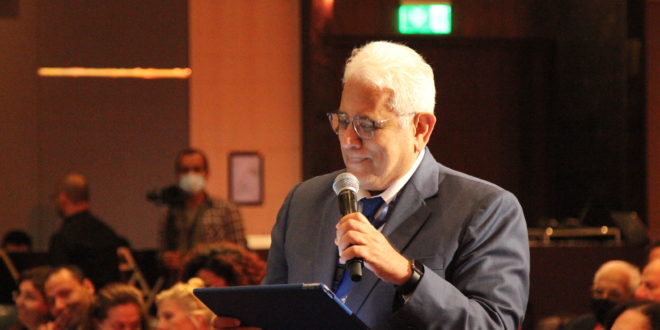Today, Prof. Hossam Badrawi gave an important lecture via the Zoom platform as part of the Sustainable Development Ambassadors initiative organized by the National Institute for Governance and Sustainable Development in a dialogue on education, transfer and localization of knowledge, technical and technological education and the future of the labor market
The initiative is sponsored by the Ministry of Planning and Economic Development (the National Institute for Governance and Sustainable Development) in cooperation with a number of universities and relevant ministries. An initiative under the title “Ambassadors of Sustainable Development.”
The initiative aims to build national capacities in the field of sustainable development through a series of training courses for various sectors and groups of people in cooperation with various stakeholders, including patterns of development, background on the development of environmental thought in the modern era, introducing the concept of sustainable, just and comprehensive development, the United Nations sustainable development goals, The green economy, and the circular economy as mechanisms for achieving sustainable development.
In addition to discussing the enabling policies, opportunities and challenges facing Egypt to achieve comprehensive and equitable sustainable development goals and Egypt’s Vision 2030, and the role of various state institutions and groups of society, including universities, research centers, the private sector, NGOs, media, youth, women, and people with special abilities in accessing to the sustainable development goals.
Dr. Badrawi spoke during his speech about Egypt’s Vision 2030 in education, its axes and the challenges facing its implementation, explaining that it consists of five main axes.
1- Availability without discrimination for all ages
2- Governance of public administration, and governance of educational administration
3- digital
4- Building the integrated personality of the student
5- Competitiveness of graduates
Dr. Badrawi also stressed the importance of sustainability and building on what has been achieved previously, as many previous efforts have been made that should be completed and their results taken into consideration.
After the lecture, Dr. Badrawi opened the discussion and answered questions from the audience
The initiative is sponsored by the Ministry of Planning and Economic Development (the National Institute for Governance and Sustainable Development) in cooperation with a number of universities and relevant ministries. An initiative under the title “Ambassadors of Sustainable Development.”
The initiative aims to build national capacities in the field of sustainable development through a series of training courses for various sectors and groups of people in cooperation with various stakeholders, including patterns of development, background on the development of environmental thought in the modern era, introducing the concept of sustainable, just and comprehensive development, the United Nations sustainable development goals, The green economy, and the circular economy as mechanisms for achieving sustainable development.
In addition to discussing the enabling policies, opportunities and challenges facing Egypt to achieve comprehensive and equitable sustainable development goals and Egypt’s Vision 2030, and the role of various state institutions and groups of society, including universities, research centers, the private sector, NGOs, media, youth, women, and people with special abilities in accessing to the sustainable development goals.
Dr. Badrawi spoke during his speech about Egypt’s Vision 2030 in education, its axes and the challenges facing its implementation, explaining that it consists of five main axes.
1- Availability without discrimination for all ages
2- Governance of public administration, and governance of educational administration
3- digital
4- Building the integrated personality of the student
5- Competitiveness of graduates
Dr. Badrawi also stressed the importance of sustainability and building on what has been achieved previously, as many previous efforts have been made that should be completed and their results taken into consideration.
After the lecture, Dr. Badrawi opened the discussion and answered questions from the audience
 Dr. Hossam Badrawi Official Website
Dr. Hossam Badrawi Official Website


